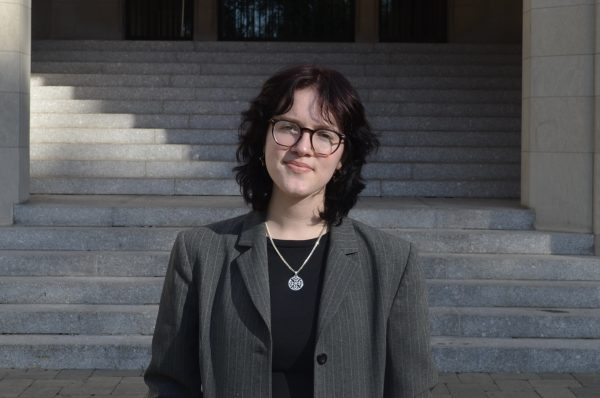Pope Francis, the first Jesuit pope, died at age 88 on April 21. Francis served as Pope for 12 years and was the first Latin American Roman Catholic pontiff. Known for his progressive policies and frugal living, Francis changed the idea of what a pope could be after the resignation of his predecessor, Pope Benedict XVI.
“Any Pope is a world figure as well as a religious leader,” said Philip Judge S.J, executive director of Campus Ministry. “Francis singularly captured the imagination, though, as a spokesman for those who were forgotten and almost invisible.”
Francis was the first pope to take the papal name of St. Francis of Assisi, a pious friar who founded the Franciscan order. This dedication to piety meant he rejected most of the traditional niceties of his office.
“I am not Catholic, but I have been with Catholic education for nearly a decade. I will always be grateful for being so under his papacy,” said Andrew McDonald, FCRH ’26. “And I have the most respect for a man, the first Jesuit pope, for the work he did reforming the Church and everything it touches into a more welcoming, more peaceful, and more egalitarian future, with the purpose of lifting up the most marginalized. He was truly a titan of this era and of my life.”
Francis was hailed for his acceptance of the LGBTQ+ community in the Catholic Church. When asked about it in 2013, Francis said, “Who am I to judge?”
“As a queer Catholic, Pope Francis’ papacy has meant a lot to me, and he’s made me feel so much more valid in my faith,” said Theda Wilkins, FCRH ’27. “His love, compassion, and openness to those who have been historically shut out from catholicism is unprecedented from a Pope.”
Fordham University is home to the Fordham Francis Poverty Index, a project created by Fordham’s Graduate Program in International Political Economy and Development (IPED) to help measure the welfare of impoverished people worldwide. The University began the project after Francis’s 2015 address to the United Nations General Assembly, where he suggested a tracker so people could better understand where help was needed.
“So many people today have such a low opinion of the poor. But to Francis, a person, and especially a poor, broken, and marginalized person, is so very special,” said Professor Henry Schwalbenberg, director of IPED. “They are transcendent, created in the image of God and especially beloved by God. Because of their transcendence, the dignity of everyone and especially of those who are weak, broken, and marginalized must be respected. Their human dignity requires that they be empowered and have the freedom to guide their own growth and development and, if need be, break free of any bonds of oppression they might face. For this reason, the Fordham Francis Index, following the ideas of the Pope, mixes together statistical measures of both basic human needs as well as critical human rights. Through this somewhat unique combination of statistical indicators, we are able to measure the well-being of the global poor in a more profound way.”
While there has been little improvement seen in the well-being of impoverished people, Schwalbenberg said Francis writes to the students involved in the program almost every year.
“Francis has written to us saying how ‘deeply appreciative’ he is of our efforts and offering us his ‘prayerful good wishes’ for our work,” said Schwalbenberg.
Some students are concerned about Francis’ successor, who will be chosen through a conclave, which will begin in early May.
“I just entered the Catholic Church because of its emphasis on social justice, advocacy for marginalized communities, care for the environment, the elimination of the death penalty, and so many other values that Pope Francis emphasized throughout his papacy,” said Hailey Baker, FCRH ’27. “Though he lived an amazing and long life, it’s heartbreaking not to have him here anymore, leading the Church. My friends and I are terrified about the uncertainty of what comes next, especially with the very real possibility that we may get a new pope who is more conservative and works to undo the progress Pope Francis made.”
The new Pope can technically be any baptized man, but traditionally, they are Cardinals.
“I don’t know where the church will go next without him, honestly, but he’s given me a lot of hope for what the church can and should be,” said Wilkins.
“I think Pope Francis helped me empathize more with people whom with I have foundational disagreements. Coming from outside the Catholic Church, I did not expect to be as moved by his passing as I am,” said Nate Kysilko, FCRH ’28.
Pope Francis was honored in a mass today at St. Patrick’s Cathedral in Manhattan and in one at the Fordham Church.
“It may be that his lasting legacy will be that spirit of Synodality which calls us to find God in all things as a community,” said Judge. “Personally, a Jesuit brother as Pope has been an extraordinary inspiration. May his example inspire us at Fordham to continue to care for one another and our common home.”








































































































































































































